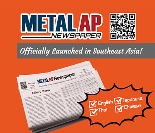
China Foundry
Scope & Guideline
Exploring Breakthroughs in Foundry and Materials Processing
Introduction
Aims and Scopes
- Metal Casting Techniques:
Research on various metal casting methods including traditional and advanced techniques such as high-pressure die casting, sand casting, and additive manufacturing. - Material Characterization and Properties:
Investigations into the microstructural characteristics, mechanical properties, and performance of different alloys and composites utilized in casting processes. - Process Optimization and Simulation:
Development and application of numerical simulation techniques to optimize casting processes, including thermal analysis, fluid flow modeling, and solidification behavior. - Innovative Materials Development:
Exploration of novel materials, including high-entropy alloys, composite materials, and advanced coatings aimed at improving the performance and durability of cast products. - Environmental and Economic Sustainability:
Research focused on reducing the environmental impact of foundry operations through waste recycling, energy-efficient processes, and sustainable material usage. - Casting Defects and Quality Control:
Studies aimed at understanding and mitigating casting defects, enhancing quality control measures, and implementing advanced testing techniques.
Trending and Emerging
- Additive Manufacturing in Foundry:
Significant growth in publications related to additive manufacturing techniques, emphasizing their application in producing complex geometries and enhancing design flexibility in casting. - Advanced Characterization Techniques:
An increasing focus on advanced characterization methods such as machine learning, artificial intelligence, and high-throughput experimentation to understand material properties and optimize processes. - Sustainability and Green Foundry Practices:
A rising trend towards research on sustainable practices, including the recycling of materials, energy-efficient processes, and the use of eco-friendly materials in foundry operations. - High-Entropy Alloys and Novel Materials:
Emerging interest in high-entropy alloys and other novel materials that offer superior mechanical properties and performance for demanding applications. - Simulation and Digital Twins:
Growing emphasis on the use of simulation tools and digital twin technology to improve process design, predictive maintenance, and operational efficiency in foundry operations.
Declining or Waning
- Traditional Foundry Techniques:
There is a noticeable decline in publications centered on classical foundry techniques, as research increasingly shifts toward innovative methods and technologies. - Basic Alloy Development:
Research focusing on basic alloy compositions and their properties appears to be waning, with a shift towards more complex, high-performance alloys and composites. - Non-Automated Quality Control Methods:
The use of manual or non-automated quality control methods in foundry processes has decreased, as more emphasis is placed on automation and digitalization for enhanced efficiency.
Similar Journals
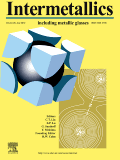
INTERMETALLICS
Unveiling the Secrets of Metals and AlloysINTERMETALLICS, a prestigious journal published by ELSEVIER SCI LTD in the United Kingdom, has been a vital resource in the fields of Materials Science, Mechanical Engineering, and Chemistry since its inception in 1993. Renowned for its rigorous peer-review process and commitment to high-quality research, this journal enjoys an impressive position within the top quartile (Q1) rankings of its categories, signifying its influence and esteem in the academic community. With a particular emphasis on the study of intermetallic compounds and their applications, INTERMETALLICS attracts groundbreaking research and innovative contributions that push the boundaries of knowledge in metals and alloys, as well as mechanics of materials. Researchers looking for a platform to disseminate cutting-edge findings will find this journal an exemplary choice, further enhanced by its commendable Scopus rankings that illustrate its widespread recognition and relevance. Though it does not currently offer Open Access options, the journal remains committed to advancing the field through selective publication of impactful research, making it an essential reference for researchers, professionals, and students alike interested in the dynamic interplay between materials and engineering.

Russian Journal of Non-Ferrous Metals
Shaping the Future of Materials ScienceThe Russian Journal of Non-Ferrous Metals, published by PLEIADES PUBLISHING INC, serves as a vital resource for researchers and professionals in the fields of materials science and engineering. With a dual ISSN (1067-8212 for print and 1934-970X for online), this journal has been instrumental in disseminating cutting-edge research from 2007 to 2023. Specializing in the mechanics of materials, metals and alloys, and the study of surfaces, coatings, and films, it provides invaluable insights into the latest advancements and applications in these areas. Although currently categorized in the Q4 tier for mechanics of materials and surfaces, and Q3 for metals and alloys in the 2023 rankings, its commitment to quality research is reflected in its Scopus metrics, ranking it within the competitive spectrum of its fields. While not an open access journal, it remains a crucial academic platform for fostering knowledge exchange among professionals and scholars. By publishing high-quality articles, the Russian Journal of Non-Ferrous Metals contributes significantly to the ongoing dialogue in metallurgical science and engineering.
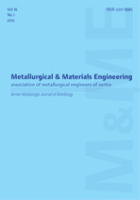
Metallurgical & Materials Engineering
Bridging theory and application in materials science.Metallurgical & Materials Engineering, published by Netherlands Press, is a prominent open access journal that has been advancing the field of metallurgical sciences and materials engineering since 2012. With an ISSN of 2217-8961 and an E-ISSN of 2812-9105, this journal provides a vital platform for researchers, professionals, and students to disseminate and access high-quality peer-reviewed research. As of 2023, it holds a Q4 quartile ranking in Mechanical Engineering and a Q3 ranking in Metals and Alloys, according to Scopus. This reflects its ongoing commitment to high standards despite being in a competitive sector. The journal covers a wide array of topics within the scope of materials science, with a focus on metallurgy and alloy technologies, and serves as a crucial resource for those engaged in innovative material development and application. Offering an open-access model emphasizes its dedication to making research widely available, thereby fostering collaboration and advancement in the materials engineering community. Join us in contributing to a dynamic and essential field of study.

RARE METAL MATERIALS AND ENGINEERING
Unlocking the Potential of Advanced MaterialsRARE METAL MATERIALS AND ENGINEERING is a vital academic journal dedicated to advancing the fields of materials science, engineering, and metallurgy. Published by the NORTHWEST INST NONFERROUS METAL RESEARCH in China, this journal has been an essential resource for researchers and professionals since its inception in 1993. With a focus on rare metals and their engineering applications, the journal addresses contemporary issues and innovations in materials chemistry and electronic engineering, providing insights into the properties and uses of advanced materials. Although it currently falls within the Q4 category for several categories, including Electrical and Electronic Engineering and Materials Chemistry, its commitment to quality and relevance in the field is evident. The journal offers a platform for researchers to share their findings with the scientific community, fostering collaboration and knowledge exchange in an important area of study. Researchers and students interested in exploring the latest in rare metal technologies and engineering methodologies will find this journal a valuable addition to their academic library.
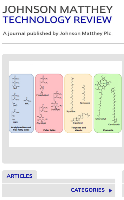
Johnson Matthey Technology Review
Transforming materials science with peer-reviewed excellence.Johnson Matthey Technology Review is a premier open access journal published by Johnson Matthey Publishing Ltd, dedicated to advancing research and innovation in the fields of Electrochemistry, Metals and Alloys, and Process Chemistry and Technology. Since its transition to open access in 2014, the journal has provided a platform for scholars and industry professionals to share their findings and insights in a rapidly evolving field. Based in the United Kingdom, this journal has garnered significant attention, achieving impressive rankings such as Q3 in Electrochemistry and Q2 in Metals and Alloys, reflecting its growing impact within the scientific community. With a commitment to promoting high-quality, peer-reviewed research, the Johnson Matthey Technology Review plays a vital role in connecting researchers, facilitating knowledge exchange, and fostering collaboration across disciplines, making it an essential resource for anyone involved in material science and chemical engineering.

Obrabotka Metallov-Metal Working and Material Science
Advancing the Future of Metal Science and EngineeringObrabotka Metallov-Metal Working and Material Science is a pivotal journal published by Novosibirsk State Technical University, focusing on the dynamic fields of mechanical engineering, mechanics of materials, and the science of metals and alloys. With ISSN 1994-6309 and E-ISSN 2541-819X, the journal serves as a crucial platform for disseminating research from Russia and around the globe. Currently classified in the Q4 category for Mechanical Engineering and Mechanics of Materials, as well as Q3 for Metals and Alloys, it encompasses a wide range of studies from fundamental research to innovative applications. Despite its relatively recent inception in 2019, the journal has established itself with Scopus rankings that highlight its growing influence—Rank #122 out of 176 in Materials Science and Rank #510 out of 672 in Engineering. This journal aims to foster collaboration among researchers, professionals, and students by featuring original articles, reviews, and technical notes that address contemporary challenges in metal processing and material science. As it continues to evolve through 2024, Obrabotka Metallov remains dedicated to enhancing the understanding and application of materials science, making it a significant resource for those invested in the future of engineering and technology.

METALS AND MATERIALS INTERNATIONAL
Elevating global discourse in materials innovation.METALS AND MATERIALS INTERNATIONAL, published by the Korean Institute of Metals and Materials, is a prestigious journal dedicated to the advancement of research in the fields of materials science and engineering. With an ISSN of 1598-9623 and a robust e-ISSN of 2005-4149, this journal has established itself as a crucial platform for disseminating innovative findings and key advancements that span condensed matter physics, materials chemistry, mechanics of materials, and the technology of metals and alloys. Its Q1 rankings in multiple categories attest to its high impact and relevance in the academic community, placing it among the top journals in its fields with Scopus rankings that reflect a strong international footprint. Here, researchers, professionals, and students can access cutting-edge research and insights, fostering collaboration and exploration of new materials and their applications. With a commitment to excellence and a convergence of knowledge from 1996 to 2024, METALS AND MATERIALS INTERNATIONAL continues to enhance our understanding of materials and their transformative impact on technology and engineering.
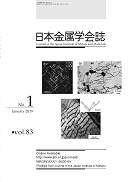
Journal of the Japan Institute of Metals and Materials
Bridging science and application in materials technology.Journal of the Japan Institute of Metals and Materials (ISSN: 0021-4876, E-ISSN: 1880-6880) serves as a vital academic platform under the esteemed auspices of the Japan Institute of Metals & Materials. This journal, with a rich publication history dating back to 1937, focuses on advancing knowledge in the fields of metallurgy, materials science, and engineering, making it an important resource for researchers, professionals, and students alike. Although the journal has been categorized in Q4 quartiles across several subject areas, including Condensed Matter Physics and Materials Chemistry, it plays a critical role in disseminating essential findings and fostering discussion regarding innovations in metal and materials research. Notably, the journal operates without open access, which encourages targeted readership engagement through its curated content. Based in Japan, it continues to contribute significantly to the academic community by bridging the gap between scientific inquiry and practical application in materials technology.

Metallurgical Research & Technology
Elevating the standards of metallurgical research and engineering.Metallurgical Research & Technology is a distinguished journal published by EDP SCIENCES S A based in France, focusing on the dynamic field of metallurgical science and engineering. With a strong emphasis on the latest advancements in Materials Chemistry, Computational Mechanics, and Mechanics of Materials, this journal aims to provide a platform for researchers to share innovative findings that propel the field forward. As of 2023, it has secured a commendable position in various categories, including Q3 rankings in Computational Mechanics, Materials Chemistry, and Mechanics of Materials, along with a Q2 ranking in Metals and Alloys. The journal actively promotes open access, facilitating broader dissemination of critical research across the globe. Researchers, professionals, and students in the metallurgical domain will find Metallurgical Research & Technology an invaluable resource for cutting-edge developments and collaborative opportunities.
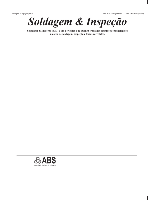
Soldagem & Inspecao
Innovating the Future of Materials and InspectionSoldagem & Inspecao, published by the ASSOC BRASIL SOLDAGEM, is a prominent open-access journal dedicated to the fields of Mechanical Engineering, Mechanics of Materials, and Metals and Alloys. Since 2009, this journal has provided a platform for researchers and professionals to share their findings in welding and inspection technology, contributing to significant advancements in material science. With its ISSN 0104-9224 and E-ISSN 1980-6973, "Soldagem & Inspecao" is indexed in Scopus and ranks in the fourth quartile for 2023 across several engineering categories. Despite its nascent metrics, the journal serves as an essential resource for students, professionals, and academics alike, enabling readers to stay updated with the latest research developments. The journal is based in São Paulo, Brazil, and actively encourages contributions that foster innovation and scientific inquiry in the welding community. By disseminating research that emphasizes practical applications and theoretical insights, "Soldagem & Inspecao" plays a vital role in bridging the gap between academic research and industry practices.